The NDP has a dream leader. One problem: She’s not running.
Megan Leslie has ruled out a run to replace Tom Mulcair as NDP Leader. Who’s left?
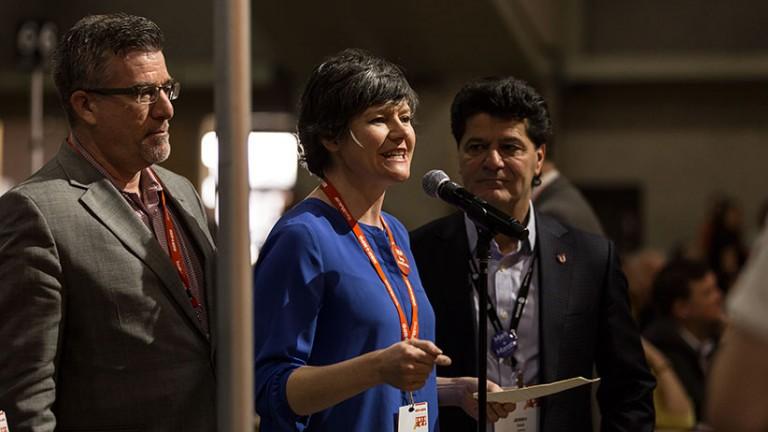
Former NDP MP and deputy leader Megan Leslie speaks at the convention in Edmonton. (Jenna Marie Wakani)
Share
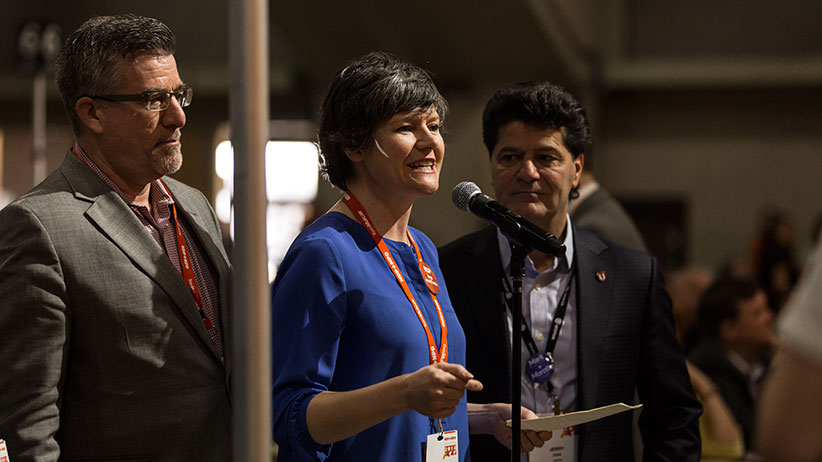
Something felt missing from the NDP convention in Edmonton where delegates voted last weekend to dump Tom Mulcair as their leader. Alberta Premier Rachel Notley delivered a textbook speech, cementing her status as the party’s star of the present. Stephen Lewis, 78, spoke with enough old-school verve to give Notley a run for her oil money, lending the affair a sense of continuity with the party’s past. But where was the future? More specifically, since showing Mulcair the door was the task at hand, where was a plausible leader to replace him?
There was a moment when the voice of what’s coming next seemed to be in the air. A current coursed though the convention hall during the debate over the Leap Manifesto when Megan Leslie—the former Halifax MP whose defeat in last fall’s election ranked for many New Democrats as the cruelest in a night full of cruel surprises—stepped up to floor microphone No. 4 to say a few words.
Argument was raging over whether to adopt the manifesto, which calls for a sharp leftward shift—including a ban on new pipelines—as the basis for two years of policy discussion. The previous day, Notley had powerfully presented the case against it, with plenty of backing from union leaders defending energy-sector jobs. But Lewis, whose son, Toronto activist Avi Lewis, is Leap’s leading proponent, countered in his speech that the prospect of “apocalyptic” climate change demands a radical response.
With the delegates deeply divided, Leslie presented herself as a bridge-builder. Her intervention was a calibrated blend of rallying cry and reassurance. She stressed that the party wasn’t being asked to embrace the manifesto uncritically, just to study it for two years. “Let’s think about how we can take [Canada’s] resource-based economy and use it to transition to a green-energy economy,” she said, mentioning, for instance, that oil sands electricians might be repurposed to build solar panels.
She went on, painting a vision of the coming NDP discussion of the manifesto as somehow a chance to foster harmony between roughnecks and climate change activists. “I want to hear from those oil sands workers, I want to hear from those pipeline builders, I want to hear from energy-efficiency retrofitters.” She declared that “a social democratic response to climate change” must protect jobs. The crowd cheered. The future beckoned.
How much impact Leslie’s intervention had on the convention’s vote a few minutes later to adopt the manifesto, at least as the basis for ongoing debate, is hard to guess. What wasn’t in any doubt was her status as the dream candidate for many New Democrats as they looked anxiously around for Mulcair’s successor. She spoke with urgency, and yet a slight smile. Her knack for conveying that left-wing causes might somehow be fun sets her apart. It’s one reason her name came up by far most often when NDP delegates—from students at their first national party gathering, to operatives who know the drill—were asked in Edmonton who might make a good next leader.
The problem is, Leslie later categorically said she will not be applying for the job. “I am not considering a run for the leadership,” she told Maclean’s. “I am ruling it out.” Despite the electricity she generated on the convention floor, Leslie said seven years in federal politics, from winning her Halifax seat in 2008 to losing it in 2015, left her battery drained. She’s not deaf to the flattering talk about her inspirational qualities. “But the NDP deserves a leader who has that fire in the belly for politics,” she said. “I don’t have that.”
It might seem odd that a decision against running for the leadership from a single former MP, and one who couldn’t even defend her own riding last fall, would send a shudder of apprehension through a national party. But Leslie’s absence from the race is that telling for the NDP. There simply isn’t another well-known candidate in sight whose talent for politics is nearly as widely admired.
Even some of her potential rivals for the leadership were openly expressing their high regard for her in Edmonton, including MP Nathan Cullen, who ran in the leadership contest won by Mulcair in 2012, and held his B.C. riding against the Liberal onslaught last October.
“Megan’s a polished, respected leader, a strong voice for women, who ticks a lot of boxes,” Cullen said. “If she had run in the last leadership race, I would not have run.”
As for speculation that Cullen might take another shot at the leadership himself, he said, “My inclination is to say no right now. When I ran the first time it was an emotional call—it certainly wasn’t logical.”
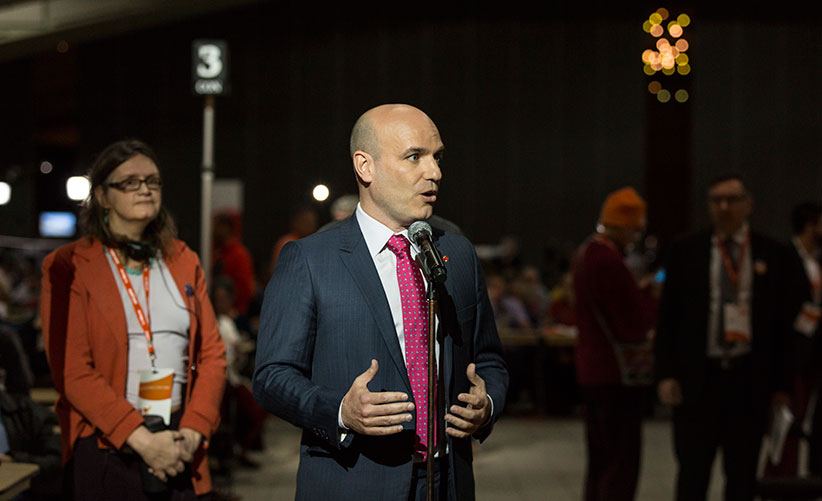
It happened that Cullen made those comments while sitting in a half-lit empty room off the main convention hall in Edmonton, just as Notley began her bravura anti-Leap speech. As he talked, she was earning big ovations, the soundtrack of winning politics playing behind his reflections on losing.
Last fall’s federal NDP campaign, with its promise of balanced budgets, was “just too cautious,” Cullen said. Down in the U.S. these days, Bernie Sanders’s unexpectedly strong run for the U.S. Democratic presidential nomination is now showing another way: more daring, less calculated. “What people are channelling is that authenticity and connectivity,” Cullen said. “What Sanders is saying is, ‘Agree with me or not, this is what I believe.’ ”
In fact, Sanders was often mentioned when convention conversation turned to what was wrong with Mulcair’s 2015 campaign, and what sort of leader is needed now. “My first hour here at our youth convention was spent talking about how exciting it would be to go down and work for Bernie Sanders,” said Lia Storey-Gamble, of Saskatoon, newly elected co-chair of the party’s youth wing.
Youth delegates tended to see Leap as the Canadian expression of a more uplifting brand of left-wing politics. Leslie’s positive take on the manifesto added to her credibility with that potentially key activist contingent.
Leslie would have been the answer to the prayers of much of the NDP establishment, too. Kathleen Monk, an experienced party strategist and familiar TV pundit, said her understanding was that Leslie wasn’t going to run. Still, when asked what personalities in the party had the potential to reignite the NDP after last year’s huge federal election setback, Monk mentioned only one by name. “Certainly I would look toward Megan Leslie,” she said. “She’s a good orator. She moves people.”
Aside from Leslie, Monk was excited about Alberta Premier Rachel Notley, who managed to bring the convention crowd to its feet over and over with a speech carefully crafted to counter the Leap Manifesto. “She made the case for why progressive governments have to fight to have pipelines so we can pay for the things that are important,” Monk said. “That’s health care, education, other social services, a $15 minimum wage. You can only do that when the economy is doing well.”
For the record, though, Notley’s communications director ruled out the Alberta premier running for the federal NDP leadership. Her chief of staff, Brian Topp, who placed second to Mulcair in the last NDP leadership race, also said he wasn’t interested in another try. Among the other contenders from that 2012 contest, Manitoba MP Niki Ashton, 33, daughter of Manitoba NDP cabinet minister Steve Ashton, is considered likely to run again.
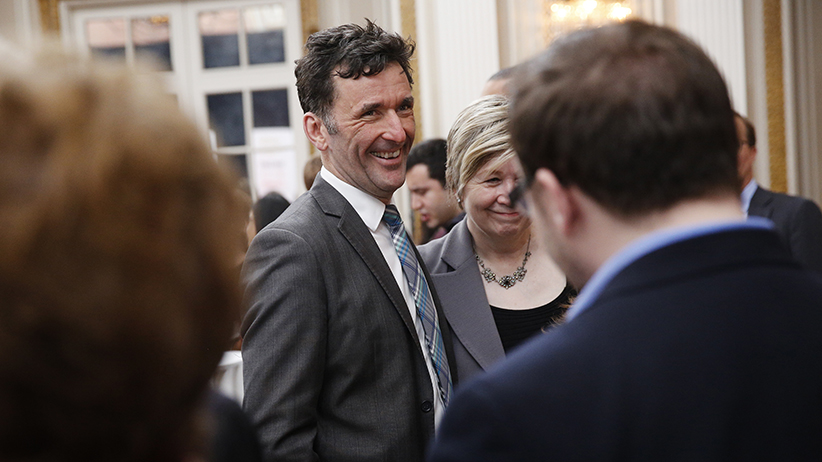
There’s also speculation about former Ottawa MP Paul Dewar, another 2012 hopeful who fell short. Like Leslie, Dewar left New Democrats in shock when he lost his seat to a Liberal last fall. Dewar is working mostly on international issues these days, dividing his time among the Canadian Global Affairs Institute think tank and non-governmental groups like Partners in Health. Pulled aside for an interview in Edmonton, he hesitated to name names for a post-Mulcair NDP leadership race, although he hazarded to mention one. “We have talent around,” Dewar said. “Megan, obviously.”
Less obviously, but still generating some chatter, are names beyond the ranks of federal MPs, current and former. Some NDP insiders are intrigued by Jagmeet Singh, who sits in the NDP caucus in Ontario’s legislature, and is a prominent organizer for the party in the South Asian community around Toronto and beyond. Avi Lewis, who makes documentary films in Toronto when he isn’t crafting manifestos (and is married to bestselling author Naomi Klein, a hero of the left internationally) would certainly stir up the race. But in an interview with Maclean’s he said that growing up as the son of an Ontario NDP leader left him with memories of the “personal and ugly” side of politics, and he’s not tempted “in the slightest.”
Perhaps less exciting, but also less risky, are MPs who survived the NDP’s plunge to 44 MPs last fall, down from 103 in 2011. Among Quebec MPs first elected in Jack Layton’s “Orange Wave” five years ago, Alexandre Boulerice, 42, a former union leader and polished TV journalist, stands out. Surprisingly little corridor speculation in Edmonton attached to caucus veteran Peter Julian, a B.C. MP first elected in 2004, even though he has solid credentials as a former NDP critic on major policy files, like finance and natural resources. Julian also speaks French, a key qualification since of 16 of the seats the NDP managed to cling to in 2015 are in Quebec.
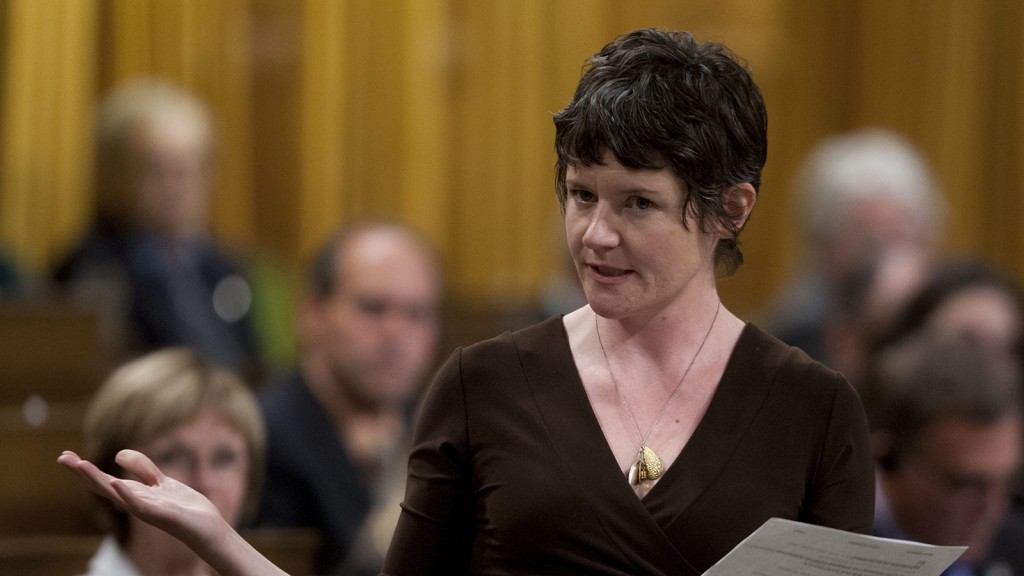
Leslie, 42, is also comfortably bilingual—another reason she looked so promising to so many. Raised in a mining family in Kirkland Lake, Ont., she studied at York University in Toronto, and then in Halifax at Dalhousie University’s law school. After graduating, she settled in Halifax to work at a community legal aid office, running for office (and winning) in 2008 and turning heads in Ottawa almost as soon as she hit the ground.
That year, her fellow MPs voted her best rookie in the annual Maclean’s Parliamentarians of the Year contest. Reflecting this week on her decision not to try for the leadership, Leslie sounded nostalgic about those early days in the House. “I was spilling over with passion,” she said. By contrast, she said wading in on the Leap Manifesto schism “took everything I had.” She worries that the next leader will have to somehow unite a bitterly divided party: “People who were afraid about this being polarizing were right.”
What’s next for Leslie isn’t clear. Less than two months after last fall’s election, she landed a job as senior consultant on ocean governance with World Wildlife Fund Canada. But that temporary role ends in June, and Leslie said she is looking for a job back home in Halifax, where her partner, an energy researcher, recently landed a prestigious Banting Postdoctoral Fellowship at Dalhousie University.
In fact, the possibility of Leslie not running, and the more general lack of a compelling field of contenders, wasn’t lost on party veterans in Edmonton. Immediately after Mulcair was voted out, their next move was to present a motion, which easily passed, to extend the deadline for the coming leadership convention from the standard 12 months to up to 24 months.
Former MP Andrew Cash, an ex-punk-rock musician who lost his downtown Toronto riding as the Liberals ran the table in the country’s biggest city last fall, said it was far too early to guess who might emerge as viable leaders. “People were not organizing in advance of the convention,” Cash said just minutes after Mulcair’s tearful exit from the hall. “We have some time now to think about where we’re going. It will take six months for folks to put their teams together.”
A lot can happen in six months. Almost anything in two years. Layton was a Toronto city politician with no federal experience when he announced his outsider bid for the NDP leadership in 2002. Up to a few months before Justin Trudeau launched his candidacy for the Liberal leadership in 2012, he was still saying that, as father of young children, the time wasn’t right for him.
So it’s far too early for serious handicapping of the NDP leadership sweepstakes. Still, when Tom Mulcair was being unceremoniously brought down, it was clear many New Democrats were hoping Megan Leslie was ready to step up. Now that she’s disappointed them, it must be hitting home that the real leap they made in Edmonton was entirely into the unknown.